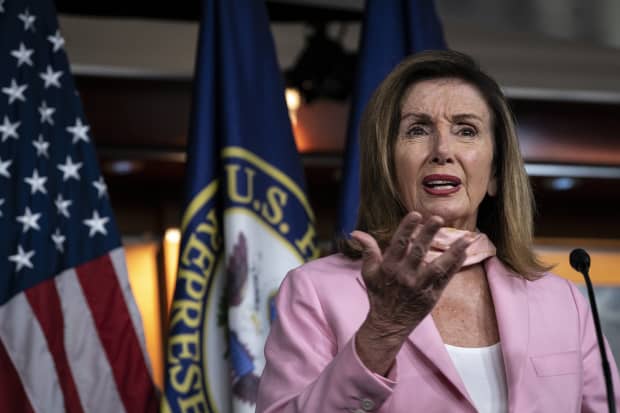This post was originally published on this site

House Speak Nancy Pelosi said she was not willing to temporarily extend the extra $600 in unemployment benefits for a week because lawmakers are not ‘on the path’ to an agreement regarding the overarching stimulus package.
Getty Images
Time is up for lawmakers on Capitol Hill to reach an agreement on the supplemental $600 unemployment benefits that are set to expire officially on Friday. To prevent Americans from falling off an income cliff California state legislators are taking matters into their own hands.
Since the $2 trillion stimulus package known as the CARES Act passed in March, over 30 million unemployed Americans have collected an additional $600 a week in unemployment benefits on top of what they would receive from their state.
Lawmakers had until July 31, the date the supplemental benefit is set to expire, to prevent jobless Americans from receiving pre-pandemic levels of unemployment benefits but failed to pass an alternative.
Republican lawmakers hold that the extra $600 is akin to paying Americans not to work, given that two-thirds of Americans have received more in unemployment benefits than they would from working. Instead, Republican senators proposed, as part of the recently unveiled HEALS Act, lowering the supplemental benefits to $200 a week for two months until state workforce agencies can implement weekly unemployment benefits equal to 70% of a workers’ prior wages.
House and Senate Democrats hold that the Republican proposal for unemployment benefits unfairly penalizes Americans who are unemployed due to the pandemic. “If you’ve lost your job through no fault of your own, Republicans want you to take a 30% pay cut,” Senate Minority Leader Chuck Schumer, a New York Democrat, said Monday.
The $3 trillion stimulus package House Democrats passed in May, known as the HEROES Act, calls for extending the extra $600 through January 2021.
Democrats rejected a proposal to temporarily extend the $600 boosted unemployment benefits for one week.
Temporary extensions are only appropriate when lawmakers are “on the verge of having an agreement or you have an agreement,” House Speaker Nancy Pelosi told reporters on Friday.
In California, where more than 8.7 million Americans have filed for unemployment since March, lawmakers said they would be willing to dip into a federal trust fund to continue to pay Californians the extra $600 a week. Otherwise, the state unemployment checks will go back to the weekly average of $340 a week.
“There are so many people who are relying on that money to pay rent, to buy food. I think the state has to do everything possible to help them pay their bills,” Assemblyman Phil Ting, a Democrat leading the initiative to increase state unemployment benefits, said Wednesday.
The state’s governor, Gavin Newsom, a Democrat, indicated this week that he is reluctant to sign off on that plan, which was proposed by the 25 members of the state Senate and Assembly, and is hopeful that Congress will reach an agreement, the LA Times reported.
Representatives for Newsom did not immediately respond to MarketWatch’s request for a comment.
Arizona Gov. Doug Ducey, a Republican, said it would not be possible for his state to offer a higher amount of unemployment benefits if Congress doesn’t pass a measure of their own. The maximum weekly benefit one can collect is $240, that’s the second lowest amount a state provides in unemployment benefits.
In contrast, Massachusetts pays unemployed workers up to $1,234 a week, the highest benefit among all states.
“We don’t print money at the state level. We’re not in a position today, especially during a pandemic, to be borrowing money,” he said at a press conference held Thursday.
New York and Maryland, instead of increasing unemployment beneficiaries’ weekly checks, have passed measures to extend the number of weeks an individual is permitted to collect unemployment benefits by 20 and 13 weeks, respectively.
The differences of opinions among Democrats and Republicans regarding liability protections, funding for states and the price tag of the stimulus package, among other issues, will likely stretch into the weekend, White House Chief of Staff Mark Meadows said on Friday.
As discussions continue, Americans can explore the amount of unemployment benefits they may be eligible for under various plans that have been proposed by lawmakers using this interactive tool produced by the U.S. Chamber of Commerce, a lobbying group for businesses.

